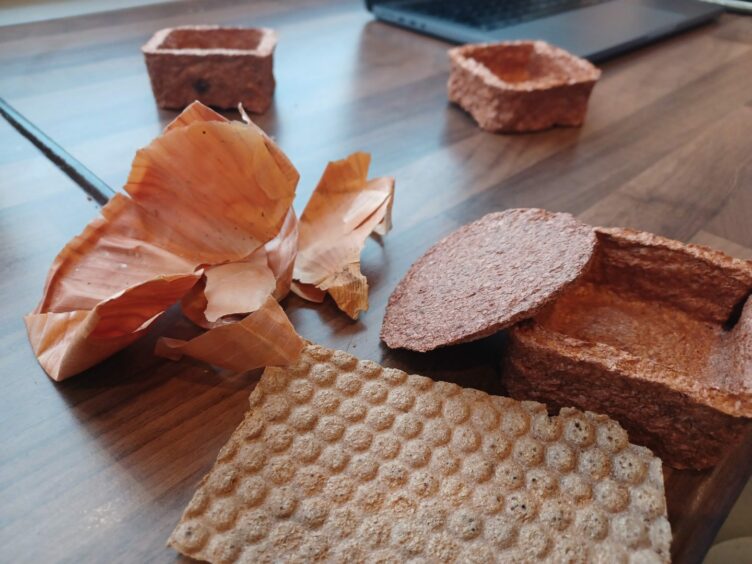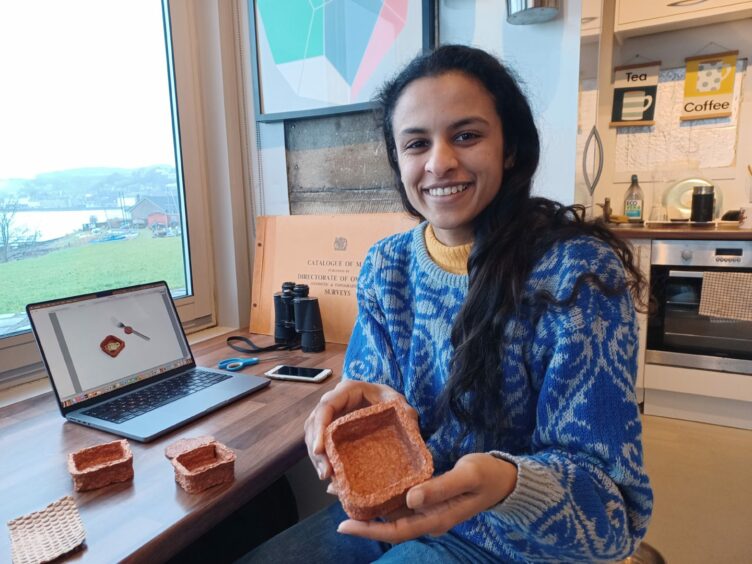Oban-based Renuka Ramanujam has come up with the novel idea of using onion skin to create a material which could replace single-use plastic and extend the shelf life of perishables such as fruit and vegetables.
Ms Ramanujam, 28, became more and more conscious of recycling while working in the textiles field, with the result her concept has seen her scoop one of Innovate UK’s Young Innovator awards.
The prize is worth £5,000 with Ms Ramanujam looking to tempt supermarkets with her onion skin-based packaging which could extend perishable foods’ shelf life by up to five days.
Onion skin contains anti-bacterial compounds and has anti-oxidants which slow down the oxygenation process that causes food to go off.
Oban ‘respite from London’
Known as ‘HUID,’ the material’s name reflects Ms Ramanujam’s extremely varied background. Dutch by nationality, she grew up in Singapore, has been in the UK for 10 years and her parents are from India.
‘Ui’ is the Dutch word for onion and ‘huid’ means onion skin.
Ms Ramanujam moved to Oban during the pandemic in part to be able to make HUID a reality and after she had been freelancing for a client near the Highland town.
“She suggested I move to Oban to take respite from London for a few months to wait the pandemic out,” said Ms Ramanujam adding: “I moved here and I’ve not left.
‘HUID’ is Dutch for onion skin
“The close-knit community and the scientific hub that has been building here (along with the cheaper cost of living) mean it is actually a really great place to be building HUID. ”
And with British consumers throwing away a staggering 66,000t of the vegetable’s skin every year according to the British Onion Producers Association (BOPA), Ms Ramanujam used her textile knowledge to good effect.
“I was using onion skin for traditional dye – people have been using it to dye fabrics for a long time but not necessarily on an industrial level,” she told the Press and Journal.
“The (idea) revolves around taking an abundant source of good waste and a creating a material which can be used as an alternative to food packaging. I wanted to create something that could really match a problem with true scalable impact.
“With the cost of living and energy crises people are talking about ways they can contribute to the community and wider development,” said Ms Ramanujam.
Renuka is currently at the R&D stage, working in collaboration with Strathclyde and Northumbia universities to improve and test the material, with the £5,000 cash going a long way to helping the testing process.
Award adds to Scottish Edge prize in 2022
The Young Innovator award is not the first prize Ms Ramanujam has scooped either, with the Oban scientist also winning a Scottish Edge gong last year worth £10,000.
That R&D is expensive stuff and the funding will be put to good use as Ms Ramanujam looks to create a prototype with a 3D modelling process “to take further” with private investment or the next funding round.
Ms Ramanujam added: “I have already done some initial testing but want to use industrial machinery; just having a bit of (financial) wriggle room to do trial and error.
“The first product we looking to launch is a punnet box which holds mushrooms or grapes. They get quite soggy so we are trying to match up to plastic in that sense.
“In the long term, we are aiming for foods where plastic was not able to be replaced; boxes for tofu or meat where there are more stipulations to keep fresh. (Plastic) films are also on our radar.”
After her peripatetic life so far, the Oban scientist confessed to “really liking being in Scotland” with access to nature and the outdoors.
Ms Ramanujam currently works out of a little studio which “obviously” limits R&D activity, hence the universities collaboration, while she has also worked with bio-chemists at the “huge science park” in Oban for initial testing.
Ms Ramanujam said: “Being a sole founder has been quite challenging and overwhelming. Financially, the award will alleviate so much stress and allow me to focus on developing the product.
Scotland scoops four Innovate UK Young Innovator Awards
“Also, building a network with other like-minded young innovators is a great opportunity to be able to share with people who can relate to you.”
Perhaps as a result of the pandemic stymying activity, the Young Innovators competition received almost 700 applicants this year, up 25% on the previous competition.
Scotland scooped four Innovate UK Young Innovator Awards taking a share of the £1.25m prize fund.




Conversation